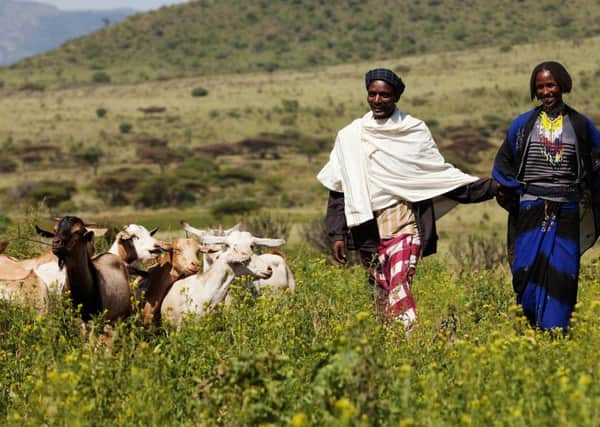Alistair Dutton: Dig deep to prevent Ethiopia crisis


As you read this, more than ten million people are desperate for rain to fall in Ethiopia. They’re hungry and need help. The two main rainy seasons in 2015 failed in many areas and the next one isn’t due until next month. Even if rain does come, it’ll take months for families to grow enough food to survive as the next harvest isn’t due until May.
While the food crisis in Ethiopia looms large this year, the country has come a long way in recent decades. With economic growth of over 10 per cent it has one of the world’s fastest growing economies. Surrounded by deeply troubled Somalia, South Sudan and Eritrea, Ethiopia also provides a home to 700,000 refugees, more than any other country in Africa, and gives help to more of its poorest people than any other country on the continent.
Advertisement
Hide AdAdvertisement
Hide AdDespite the progress, this proud African nation remains one of the poorest countries in the world, ranked 173 out of 187 according to the United Nations. The climate is changing dramatically, with more extreme and erratic weather patterns causing more frequent and severe droughts and floods. The lives of many Ethiopians, used to carving out a living in this already harsh environment, have become much harder.
I’ve just returned from Ethiopia where I saw first-hand how the Scottish Catholic International Aid Fund (Sciaf) is helping families hit by the current crisis and many others who have been supported through previous droughts. I travelled to Borana, a region in the south where most families are cattle herders, poverty is widespread, and one in three people survive on less that 65p a day.
In one village I met Carfi Sara, his wife Kabele and their three children. Carfi and Kabele struggled to survive when their cattle died in a drought in 2011. They were left penniless and unable to get enough food to eat. Working with local organisations we gave them eight goats, a camel and a donkey. Now the children have milk to drink, go to school, and Carfi and Kabele earn an income selling the milk too. Carfi told me his family’s situation is much better than before.
“Life is difficult here,” he told me. “Some people only eat once a day. Before your help, we were paralysed by poverty. I was desperate. My children would see their friends drinking milk and they would be envious.
“Now my children have milk of their own to drink – and enough to share with others. I’m able to sell the milk of two camels at market. I bought my oldest daughter a uniform and shoes so she can go to school. I have been helped, and now I help others.”
Carfi and his family’s story is at the heart of Sciaf’s Wee Box, Big Change Lent appeal this year, helping us to raise money for our work in Ethiopia and other poor countries. For the second year running we’ll also have UK Aid Match funding which means for every £1 you give between 5 February and 4 May, the UK government will donate a further £1.
With the money from this appeal we can help more families. We’re already helping thousands of people affected by the current drought in Ethiopia and have sent £80,000 to buy food for older people, pregnant mothers and children.
To the families hit by drought we also give drought-resistant seeds, help them set up small businesses and pay people to clear areas of bush, improving grazing land for their animals, or digging ponds to capture more water when the rains do come.
Advertisement
Hide AdAdvertisement
Hide AdWe’re also supporting an innovative insurance scheme which pays out when regional satellite imaging shows the grassland coverage, which cattle depend on for food, drops below a level which can sustain them. This helps the herders to buy feed for their precious animals to keep them alive and food for their families.
It’s vital that we continue to work with communities long after emergencies, to help them become stronger and better able to cope with the droughts and floods they’re expecting to face in the years ahead.
With Pope Francis declaring 2016 a Jubilee Year of Mercy, we have an opportunity to reflect on the meaning of mercy in our own lives, and what we can do to help the most vulnerable members of our global family. This means giving immediate help to people in crisis and later providing long-term support so they become stronger and more able to deal with the trials they’ll face in the future.
• Alistair Dutton is the director of Sciaf. To find out more about the Wee Box Lent appeal visit www.theweebox.org or call 0141-354 5555